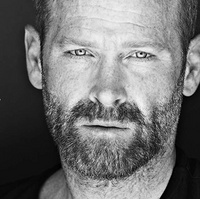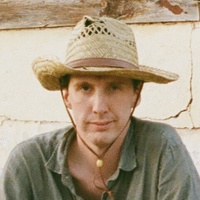As told to T. Cole Rachel, 1731 words.
Tags: Film, Independence, Process, Business, Production, Multi-tasking, Education.
On the value of being resourceful
Actor and filmmaker Max Martini on writing and directing his own films, the surprising things you learn from art school, and why tenacity and resourcefulness are important.You wrote, directed, and starred in Sgt. Will Gardner, a movie that deals intensely with things like PTSD and what life is like for people suffering from traumatic brain injuries. What was the experience of making a film where you’re involved in every aspect of the production? How difficult was it?
It wasn’t necessarily difficult, but there were a lot of challenges. I was somewhat nervous about directing, but by the time we started, it had already been such a journey. We were seeking out financiers who would give back to charity and profit share with charities without a write off, and that proved difficult. That’s not something that generally happens in the film world. There were a lot of hurdles.
Luckily, I had about nine years to prepare as a director, and I’ve been very fortunate that I’ve been able to work with a lot of big directors. During that time I’ve been doing a lot of watching. I think about everyone I’ve worked with, from Spielberg to Michael Bay to David Mamet to Robert Zemeckis to Guillermo del Toro, that I’ve been able to steal from or, for lack of a better work, to borrow from. I spent a lot of time observing them and just taking notes in my mind.
So, going in as a director, I was really prepared. Once I figured out by day two that I could actually do it, I relaxed back into the seat. As far as the experience itself goes, it was wonderful to have such a tremendous amount of collaboration from the cast and crew to the veteran community and all of my military friends. One of the other hurdles for me, other than directing, was acting out a role that had elements I was unfamiliar with, one of them being PTSD and another being alcohol dependency. As with any role, there were things that were foreign to me. I was lucky to have a lot of help. I did research. I reached out to my buddies. I reached out on social media. People sent in videos. People talked to me about it. Given that this was a project aimed to also help veterans suffering from these same issues, people were anxious to help. People were very forthcoming and that was very valuable.
I think it comes across on screen. One of the things I wanted to accomplish with this movie was to show somebody who’s at a very low point in his life, and illustrate that with just an iota of assistance how dramatically the road can shift. So through the character and the writing, I wanted to touch on things like PTSD and the realities of that, but also show that this character, even at this low point with just a little help, is capable of employment, is capable of fatherhood, is capable of companionship. I also wanted to show how, when any of that support is taken away, how quickly everything can crumble.
My hope was not just to make a good film, but also to make piece of art that really does something out in the world, which feels rare. I wanted to raise a certain level of awareness about what these soldiers are suffering from, both emotionally and physically, and maybe inspire people to get involved and help.
You’ve been working in movies for a long time, but you have also worked in theater and spent time as a co-director and producer. Is there something more you get out of the process when you aren’t just working as an actor?
I actually have a degree in fine arts. Initially, just coming out of university, I thought I was going to paint and sculpt. My father was a sculptor. We both worked with really big, heavy materials. I loved it. Weirdly, I got into acting as a way to pay off my university, which is not very common, but it worked. Then, once I started acting, I just never went back. Directing was the first time that I actually felt like I was accessing certain creative areas of my brain that I don’t get to access as an actor, so it was fulfilling in that regard. I just wanted to expand. Acting is great, but you provide this one very specific part to the equation. In filmmaking, with producing, directing, and writing, you can work in a lot of different, bigger ways. I felt like it was time to move forward, and I didn’t want to limit myself to just acting.
You have your own production company and right now you have a variety of scripts in development. In our conversations with young filmmakers on TCI, there’s this idea that you can’t necessarily wait around for someone to give you a job or an opportunity. So much of the work involves being proactive and creating your own opportunities in order to tell the stories you want to tell. Is that something that also motivates you?
Well, one thing I love about Sgt. Will Gardner is that it’s a movie that’s designed to literally give back to people, which is a very funny idea in Hollywood. I don’t think there’s been a movie produced in this way that gives to charity. That’s a new thing. Also, this isn’t a movie about a special forces guy, he’s a regular infantryman. That felt important to me. I love the idea of reinventing the wheel. Getting this movie made felt like that.
Also, part of me knows that if I wait for the phone to ring, I’ll be waiting a really long time. I think that to be successful in this business you have to be self-motivated and aggressive. I’m just going to create my work, and in doing so, take on the projects that I want to see in the world. Sometimes it’s on you to figure out a way to make that happen.
I have a lot of friends that I grew up with who wanted to be in the arts, and a handful of them wanted to be actors. Because they weren’t self-motivated, a lot of them are in their late 40s now and they probably should have pulled the plug on this idea back in their 20s. It’s a harsh reality when you realize one day that the phone call that you’d been waiting for probably isn’t going to come. Or that you were the one who should have been making the call. You do just have to be aggressive. I’m just trying to create more opportunity for myself, and doing so in ways that I believe are new and innovative.
How do you balance your career as an actor with other demands?
I don’t know, exactly. Right now I’m going to go direct two movies in Mexico. I’m doing them back-to-back. One was part of a deal I made with the company that ultimately bought Sgt. Will Gardner. The other one we’re folding into the shoot. The second one I took on as just a fun movie to direct. It’s a genre film called The Manson Brothers: Midnight Zombie Massacre. My crew from Sgt. Will Gardner will be back together and we’re going to shoot one action film and one zombie film, back-to-back. Hopefully we’ll have a lot of laughs in the process and not go crazy.
Both as an actor and a filmmaker, are there certain things about the process that you were surprised to learn? Or things you wish someone would have told you when you were younger?
Nothing that I wish somebody had told me necessarily, but I was surprised by how much my art degree has actually assisted in my filmmaking. That’s a pleasant surprise. Also, when I was younger and still very much an aspiring artist, my father encouraged me to write letters to other artists who were influences in hopes that I could go and work for them. I wrote a letter to Jasper Johns and I wrote a letter to Julian Schnabel. Surprisingly, they both wrote me back and they both offered me jobs. I took the job with Julian Schnabel. The Diving Bell and the Butterfly is one of my favorite movies. The way it’s shot, the way it’s photographed, it’s just so beautiful. I think working for Julian and seeing him work was impactful and had a big effect on me. It showed me how you could crossover and how all of these things could inform each other.
I think my own experience as a visual artist came into play when shooting things like combat scenes. Some of them I shot very conventionally, but for some of them I took the liberty of getting more creative and stylized in how they were photographed. Looking at the shots, it was nice knowing that the $150,000 I spent on my art degree didn’t completely go to waste. That was kind of a nice feeling. The work I make is definitely affected by these sort of painterly visions that are always in the forefront of my thoughts.
That’s good to hear. Art school often gets a bad rap. It can be hard to justify spending a lot of money on an education that doesn’t always feel terribly practical.
I learned a lot in art school. When I was a student I didn’t have any money and I was living in New York City. Everything I made went to rent, school, and art supplies. I ended up working with a lot of found materials. I would have an idea for a piece, but because I didn’t have the resources or the money to go out and just buy things, it forced me to be creative. I think that’s one of the things I’ve carried through the rest of my life, particularly as a filmmaker. I don’t necessarily have the same things that Steven Spielberg has at his disposal. I’m not working with huge budgets. When there is this thing you want to make, you have to just figure it out. You have to be resourceful.
Suggested Max Martini:
-
Sgt. Will Gardner (2019)
-
13 Hours (2016)
-
What the Night Can Do (2017)
-
Redbelt (2008)
-
The Unit (2006-2009)




